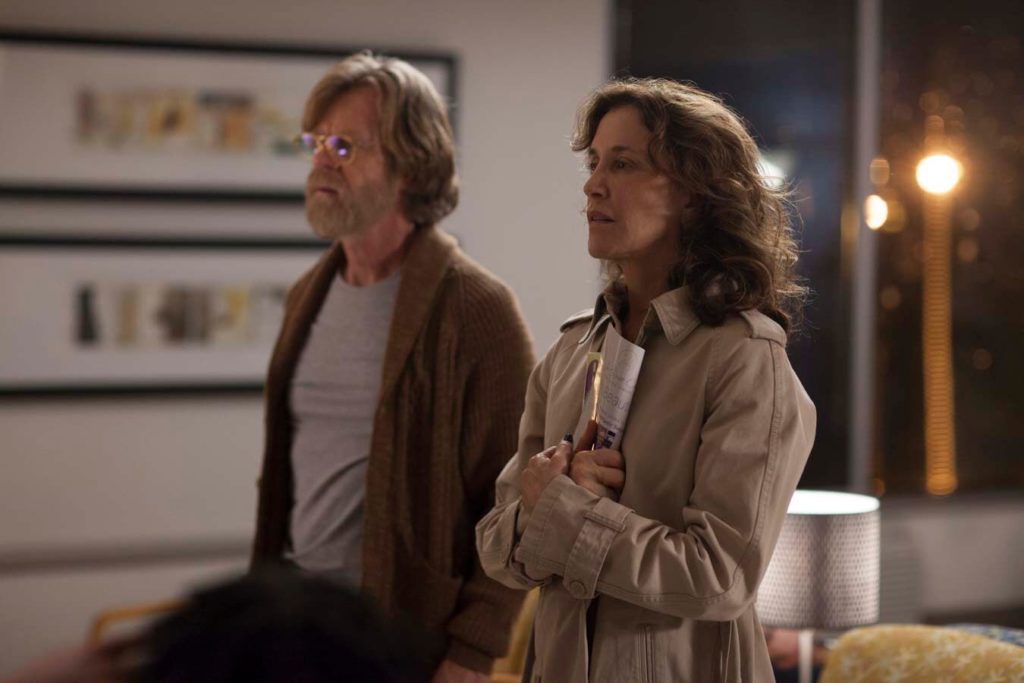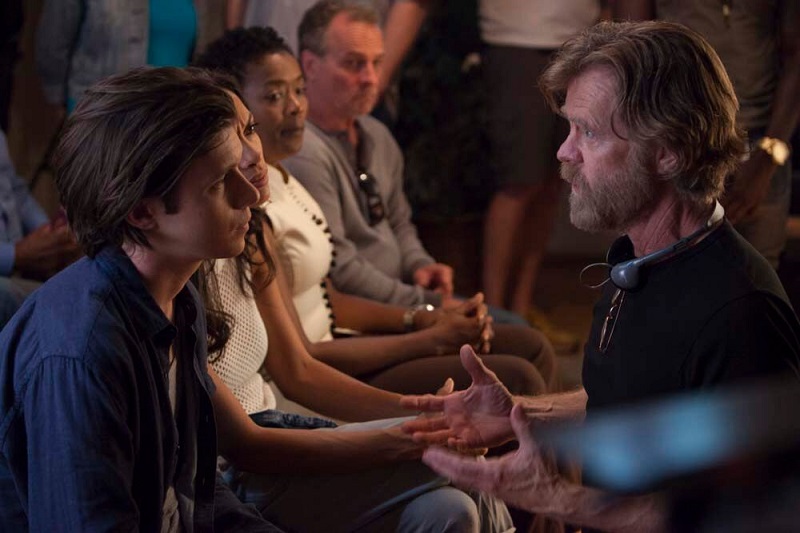In Krystal, star Felicity Huffman got to star alongside and be directed once again by her husband, William H. Macy. In the film, the two are the patriarch and matriarch of the Ogburns, a Southern family with two strong-willed boys. The oldest, Campbell (Grant Gustin) is a successful painter and the other Taylor (Nick Robinson, fresh off his stunning turn in Love, Simon) is a lovestruck eighteen-year-old with a fragile ticker. When he first meets a woman, Rosario Dawson’s title character, her mere presence sends him to the hospital with potential heart failure.
After working in independent film, the stage and a series of TV shows, Huffman scored that elusive rocket ship of acting success when she was cast in the ABC smash hit, Desperate Housewives. She is also an Oscar nominee (for Transamerica), an Emmy winner and a seven-time Golden Globe nominee. Since Housewives went off the air, she has kept busy working on passion projects such as Krystal, as well as appearing in her husband’s Rudderless in 2014 and the Emmy nominated American Crime.
Huffman phoned The Movie Mensch for an exclusive chat where she takes us inside the making of Krystal, the southern fried charmer. She gives some priceless insight into the directing style of her husband, the stellar ensemble cast (which includes Oscar winner Kathy Bates, TI and character actor extraordinaire William Fichtner), explores the joys of hitting Macy in the head with a rolled-up newspaper repeatedly and getting paid for it. Huffman also shares some touching insight into why the actress got into, and stayed with, the treacherous world of performance that finds so many more failing to ever make a “living wage.”
The Movie Mensch: The Krystal script, first and foremost, I felt like I was listening to the richest dialogue in recent memory. Is that something that first struck you when reading it? What else about this delightful, heartwarming (pun intended) story?
Felicity Huffman: Yes! This was a script that when Bill read it he said, “I am now going to throw my hat to direct.” It took so long to bring to the screen, he did two other movies. But, it was the dialogue that was so rich. Will Aldis writes it like a novel. Every character gets a specific voice and an arc. It’s rich in a way that is unusual these days.
The Movie Mensch: It felt like a Southern novel of old.
Felicity Huffman: It’s true. It’s like (William) Faulkner.
The Movie Mensch: Those family scenes with you and William, Nick and Grant at just pitch perfect. I know there isn’t much time usually on a lower budget film. How much pre-production time did you get to spend together?
Felicity Huffman: Bill was smart. He knew that those scenes needed rehearsal. He built in the time, much against the production manager going, “what are you talking about?!” We needed to get the rhythm. It needed to go fast and yet you talk at that Southern slow pace. So, unlike most indies, we got some rehearsal on that one and I think it shows because those scenes are so delightful
The Movie Mensch: When did you notice that familial magic at first?
Felicity Huffman: The first thing that happened is that Bill cast Nick Robinson. He came over to the house for dinner and he’s magic. He’s a sparky guy. That’s when I went, “this guy has got it.” Then, when we were rehearsing those scenes that you were talking about, you can feel it when it lifts — when the scene works. There’s an eternal magic and that’s when I went, “Oh, this is going to be fun.”
The Movie Mensch: That scene when Rosario and her Jacob come to dinner, I mean maybe it’s a credit to your director, but it truly felt like I was witnessing the best of what I love so much about the theater. It is unpredictable, madcap, funny, tense… everything we adore about this art form you all practice to perfection. How was it to put it together?
Felicity Huffman: That’s interesting. I think Bill’s been trying to put that sentence together for a while. We’ve been going, “what’s the tone of this?” I didn’t put it together. But it is what we love about the stage and what is possible in a play.
The Movie Mensch: Speaking of William — he’s so great everything — but his pitch perfect hand for me as a helmer from Rudderless to this, that is his greatest strength. What is your favorite part of being directed by him?
Felicity Huffman: Gosh, there are a lot of favorite parts. From getting to go to the set together and get to share a trailer, but that would be that way if it were acting. My favorite part of being directed by him is I trust him implicitly. So, I know that I can relax and focus on my work. If it works, he’ll tell me and if it doesn’t, he’ll tell me. Also, admiration… I admire him greatly.
The Movie Mensch: One thing I know is that accents are quite tricky. Especially one that has to be represented over an entire four-person family that is Southern and specific to that region, like in Krystal. Again, know it’s an indie film, but did you all hire vocal coaches?
Felicity Huffman: You’re right. You want to go to a vocal coach and we all did. As indie actors, we all had to pay for it ourselves and it’s not cheap. But it’s worth it. The family must be in the same world. Bill and I decided that the parents were from deeper down south. As happens when you move a little bit further north, the kids [have it] a little less. But Bill, he had grandparents that were from Mississippi, that accent comes naturally to him and he has a good ear for it.
The Movie Mensch: As someone who has been married for what is going on 23 years now, I know my wife wouldn’t mind on occasion, being able to hit me upside the head with a rolled-up newspaper. How nice was that for you to be able to do that in the picture? And how many takes did you get?
Felicity Huffman [laughs]: I think Bill came up with that I have the newspaper and then I hit him with it without looking at him. It’s such an old married thing to do. How many did I get to do? Let’s just say that I practiced quite a few. We needed to practice more [laughs].
The Movie Mensch: You’ve had such an illustrious career and are having an illustrious career. What was it about this world of performance — that is not the easiest to make a living at — that made you go down this well documented and difficult road?
Felicity Huffman: What is it that five percent of the union makes a living wage? That’s a living wage. The top point-seven percent makes those huge bucks. It was two things. When I was little I went to Zeffirelli’s Romeo and Juliet and I was swept away by the storytelling. Then, when I was ten, I think because I was loud and obnoxious, sent me to an acting camp. That’s when I was introduced to the community that is theater, acting and show folk. I feel in love with the community, as much as the profession.



